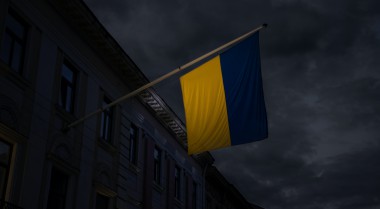
GPPAC in Eastern Europe statement on UN General Assembly emergency meeting on Ukraine
Today, 28 February 2022 at 10 am (EST), the General Assembly will hold a rare emergency special session of the 193-member UN General Assembly on Russia’s military operation in Ukraine. This will be the 11th emergency special session in UN history. During this session, the General Assembly is expected to vote on a resolution to which the Global Partnership for the Prevention of Armed Conflict (GPPAC) wants to contribute and support by way of the following statement and recommendations.
As a global network of peacebuilders, we are gravely concerned by the situation in Ukraine. We condemn the war started by the Russian Federation on February 24 in violation of international law and the Charter of the United Nations.
The UN Charter recognizes national sovereignty. Therefore, Ukraine, including its Luhansk and Donetsk oblasts, as well as Crimea, is regarded as an independent country sovereign and equal to all UN Member States.
Furthermore, the Russian Federation is in breach of international humanitarian law, human rights law and criminal law. There is no legal or political justification behind the demilitarisation of a sovereign country without a process of international law. Moreover, no evidence has been uncovered, neither by the UN nor by the OSCE mission, of human rights violations allegedly committed in the Donbas region of Eastern Ukraine.
Against this backdrop, we, as the Global Partnership for the Prevention of Armed Conflict, call upon the United Nations and its Member States to do everything in their power under international law to advance the following actions. More concretely:
We call on the UN Security Council to:
- Urge the Russian Federation and Ukraine to sign an immediate ceasefire.
- Initiate a peace process within a neutral territory such as Warsaw, Bratislava or Budapest.
- Authorize a peacekeeping force to assist a peaceful settlement, similar to the UN Truce Supervision Organisation (UNTSO), the first-ever peacekeeping operation established by the United Nations mission in Palestine. UNTSO military observers should be deployed to Ukraine to monitor ceasefires, supervise armistice agreements, prevent isolated incidents from escalating and assist other United Nations peacekeeping operations in the region.
- Call on the International Criminal Court to investigate the crime of aggression (such as crimes against peace) in the conflict in Ukraine. Concretely, the UN Charter prohibits aggressive use of force in Article 2(4).
- Deploy independent observers and fact-finders to ensure independent, public, and accessible coverage of the situation in all regions of Ukraine to address claims of disinformation. Further, their findings could inform the UN Human Rights Council in an impartial and objective way.
We call on the UN Member States to:
- Implement wider sanctions against all Russian oligarchs and closest family members. Additional measures, including asset freezes and travel bans, should be taken against key figures who have amassed huge fortunes under Putin’s regime.
- Enforce strict sanctions against any allies who provide military or troop support to the Russian Federation.
- Encourage China to publicly condemn the Russian attack and its humanitarian impact in Ukraine.
- Hold the signatories of the Budapest Memorandum on Security Assurances accountable for their responsibilities to maintain the sovereignty of Ukraine. In the 1994 Budapest Memorandum, the Russian Federation, the US and the UK confirmed their recognition of Ukraine becoming a party to the Treaty on the Non-Proliferation of Nuclear Weapons and effectively abandoning its nuclear arsenal to the Russian Federation. In exchange for Ukraine's nuclear weapons, the Russian Federation agreed “to respect the independence and sovereignty and the existing borders of Ukraine” and “to refrain from the threat or use of force” against the country.
- Ensure safe and secure humanitarian support and evacuation of citizens.
- Ensure the International Red Cross can safely return bodies to their families.
We call on the International Criminal Court to:
- Exercise its jurisdiction over and start a preliminary investigation of the crime against humanity, war crimes, and crime of aggression committed within the territory of Ukraine.
We call on the International Court of Justice to:
- Indicate the provisional measures set forth in the application filed by Ukraine on 27 February 2022 instituting proceedings against the Russian Federation before the International Court of Justice, the principal judicial organ of the United Nations, concerning “a dispute . . . relating to the interpretation, application and fulfilment of the 1948 Convention on the Prevention and Punishment of the Crime of Genocide” (the “Genocide Convention”). Ukraine submitted its application instituting to proceed with an investigation following the Russian Federation’s baseless claims of acts of genocide in the Luhansk and Donetsk oblasts of Ukraine followed by a declaration and implementation of a “special military operation” against Ukraine.

